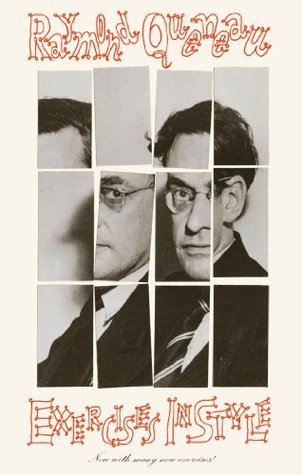What do you think?
Rate this book


A new edition of a French modernist classic - a Parisian scene told ninety-nine different ways - with new material written in homage by the likes of Jonathan Lethem, Rivka Galchen, and many more.
On a crowded bus at midday, Raymond Queneau observes one man accusing another of jostling him deliberately. When a seat is vacated, the first man appropriates it. Later, in another part of town, Queneau sees the man being advised by a friend to sew a new button on his overcoat.
Exercises in Style — Queneau’s experimental masterpiece and a hallmark book of the Oulipo literary group — retells this unexceptional tale ninety-nine times, employing the sonnet and the alexandrine, onomatopoeia and Cockney. An “Abusive” chapter heartily deplores the events; “Opera English” lends them grandeur. Queneau once said that of all his books, this was the one he most wished to see translated. He offered Barbara Wright his “heartiest congratulations,” adding: “I have always thought that nothing is untranslatable.Here is new proof.”
To celebrate the 65th anniversary of the 1947 French publication of Exercises de Style, New Directions has asked several writers to contribute new exercises as a tribute. Tantalizing examples include Jonathan Lethem’s “Cyberpunk,” Harry Mathew’s “Phonetic Eros,” and Frederic Tuten’s “Beatnik” exercises. This edition also retains Barbara Wright’s original introduction and reminiscence of working on this book — a translation that in 2008 was ranked first on the Author’s Society’s list of “The 50 Outstanding Translations of the Last 50 Years.”
228 pages, Kindle Edition
First published April 28, 1947
In the centre of the day, tossed among the shoal of travelling sardines in a coleopter with a big white carapace, a chicken with a long, feather-less neck suddenly harangued one, a peace-abiding one, of their number, and its parlance, moist with protest, was unfolded upon the airs. Then, attracted by a void, the fledgling precipitated itself thereunto.
In a bleak, urban desert, I saw it again that selfsame day, drinking the cup of humiliation offered by a lowly button.
Great cities alone can provide phenomenological spirituality with the essentialities of temporal and improbabilistic coincidences. The philosopher who occasionally ascends into the futile and utilitarian inexistentiality of an S bus can perceive therein with the lucidity of his pineal eye the transitory and faded appearance of a profane consciousness afflicted by the long neck of vanity and the hatly plait of ignorance. This matter, void of true entelechy, occasionally plunges into the categorical imperative of its recriminatory life force against the neo-Berkleyan unreality of a corporeal mechanism unburdened by conscience. This moral attitude then carries the more unconscious of the two towards a void spatiality where it disintegrates into its primary and crooked elements.
Philosophical research is then pursued normally by the fortuitous but anagogic encounter of the same being accompanied by its inessential and sartorial replica, which is noumenally advising it to transpose on the level of the understanding the concept of overcoat button situated sociologically too low.










"Psst! h'm! ah! oh! hem! ah! ha! hey! well! oh! pooh! poof! ow! oo! ouch! hey! eh! h'm! pffft!
Well! hey! pooh! oh! h'm! right!"
